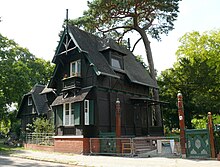Heinrich Haukohl
Heinrich Friedrich Johann Haukohl (born June 6, 1841 in Plau am See , † August 28, 1906 in Berlin ) was a German merchant and commercial judge .
biography
Heinrich Haukohl is a member of a broad family. The grandfather Christian Ludwig Haukohl, born in 1771 in Bützow , married Friederica Loeser in Plau in 1809 and took over her father's inn on Marktstrasse (today Hotel Holstein). They became the first parents of the Plauer Haukohl family.
Heinrich Haukohl started after his commercial apprenticeship - where and with whom is unknown - in 1859 in London at the wool shop “Ld. Huth & Co. ”. From 1872 he became co-owner of the company "Gustav Ebell & Co." in Berlin, also a woolen retailer with branches in South Africa ( Port Elizabeth ) and Australia.
In 1886, Haukohl had the architect Johannes Lange built the “Villa auf der Höh”, which has been preserved but has been changed to the detriment, in a prime location in Wannsee near Berlin, with a park of around 20,000 m² that is now built on. Only the gatehouse's original remained as a special example of wooden architecture in Berlin. In the meantime, however, the villa has also been partially dismantled in accordance with historical monuments.
Haukohl enjoyed a great reputation as a commercial judge at the District Court I and elder of the Berlin merchants. As a member of the Seglerhaus am Wannsee association , he was one of the sponsors of this association. He was also involved in the horticultural association and from 1880 until his death in the Society for Geography in Berlin.
In 1901 Heinrich Haukohl donated two bronze altar candlesticks to the Plauer Marienkirche in memory of his parents. In connection with a grave foundation, an inheritance burial was set up in the Plau cemetery in 1902 based on a design by the sculptor Wilhelm Wandschneider . The grave figure was stolen in December 2006.
The Plau pastor Albert Karsten was able to persuade the wealthy Haukohl to build and set up an urgently needed new day care center (kindergarten) with an associated gym as a "Haukohl Foundation" in his hometown in 1904 by the architect Otto Stahn . However, the inflation period of 1922/23 almost completely destroyed the foundation capital of 50,000 marks.
Honors
- 6. Plau honorary citizen on November 1, 1904 as thanks for the foundation of the day care center (honorary citizen's grave in the Plau cemetery)
- June 6, 1991 naming of the kindergarten on Alten Wall as “Haukohl-Kindergarten”, together with the “Haukohl-Haus”, the former gymnasium, which was inaugurated on September 23, 2004, they form the integrative Protestant day-care center “dwarf paradise” (takeover and naming in January 1994)
literature
- Heidemarie Ruchhöft: Chronicle of the City of Plau , Plau am See 2010
- Bernd Ruchhöft: From ALBAN to ZIPPE - Remarkable personalities from Plau's town history (unpublished)
Individual evidence
| personal data | |
|---|---|
| SURNAME | Haukohl, Heinrich |
| ALTERNATIVE NAMES | Haukohl, Heinrich Friedrich Johann (full name) |
| BRIEF DESCRIPTION | German wholesale merchant and commercial judge |
| DATE OF BIRTH | June 6, 1841 |
| PLACE OF BIRTH | Plau am See |
| DATE OF DEATH | August 28, 1906 |
| Place of death | Berlin |


